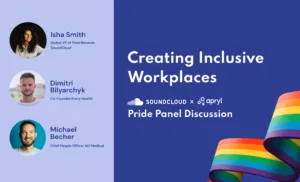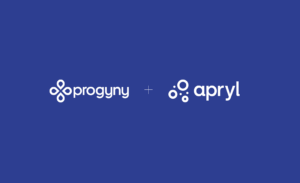People are happy, healthier, and more productive employees when they have the freedom and tools to be their authentic selves. In fact, employees who feel like they belong at work see a 56% improvement in performance. In contrast, there’s an immediate 25% decline for those who experience just one occurrence of exclusion.
That’s why LGBTQ+ inclusion in the workplace should be a top priority for your business. Supporting Pride Month is important, but inclusivity should be year-round. Aside from the difference in wellbeing that a truly inclusive workplace has on individuals, it also impacts the business as a whole. LGBTQ+-inclusive organisations can benefit from better talent acquisition and retention, enhanced customer relationships, improved public perception and increased financial performance.
In this article, we discuss how to support LGBTQ+ employees, exploring relevant employee benefits, companywide changes and individual actions that employers and colleagues can take.
Inclusive language
Inclusive language refers to communicating and interacting with others in a way that is respectful and acknowledges that people have different characteristics. It also ensures that people aren’t left out of conversations or work. And it’s an important component of supporting LGBTQ+ employees that impacts the entire workforce. 83% of millennial employees are actively engaged when they believe their organisation fosters an inclusive culture, compared to 60% when their organisation does not.
Employers can support LGBTQ+ employees by adopting inclusive language and demonstrating to their workforce how to do the same. Key aspects of inclusive language include avoiding assumptions and recognising that gender, sex and sexuality are all separate concepts. As terminology is always evolving, mistakes can happen. When they occur, simply apologise and correct yourself.
Visible allyship
Being an ally means standing with the LGBTQ+ community and challenging the systems that perpetuate inequality and discrimination. Many people support the known LGBTQ+ individuals in their lives but supporting those that you don’t know and promoting equality for all can make a huge difference in the workplace. As an employer, you can lead by example and be a visible ally through:
- Adding your pronouns to your email signature
- Asking others for their pronouns and sharing yours
- Acknowledging your privilege
- Confronting your prejudices and unconscious bias
- Promoting LGBTQ+ causes
- Using inclusive language
- Challenging discrimination
- Not shying away from LGBTQ+ topics
Anti-discrimination policy
This ties in closely with being a visible ally. No company can truly support and be inclusive of LGBTQ+ employees if they turn a blind eye to discrimination in the workplace.
35% of LGBT individuals hide their identity at work due to fear of discrimination yet 40% of LGB+ employees and 55% of trans employees have experienced workplace conflict. The most common issues include being undermined or humiliated, heated arguments and verbal abuse. For 50% of such cases (where discrimination, physical assault, and verbal abuse occurred), there was no resolution. This resulted in 16% of LGB+ workers and 18% of trans workers feeling psychologically unsafe at work.
Employers can implement an anti-discrimination policy that explicitly states zero tolerance for any form of discrimination. This policy should be enforceable across all business activities including day-to-day operations, recruitment, and promotions. The employer must ensure that all employees know this policy and the consequences of not abiding by it. For employees that breach the policy, prompt action must be taken.
Diversity, equality, and inclusion training
18% of LGBT staff state they have been on the receiving end of negative comments or conduct in the workplace in the last year solely because they are LGBT. Even more shockingly, 1 in 8 trans employees report having been physically attacked by colleagues or customers in the same period.
Education and discussion of LGBT history, identities and issues are paramount in overcoming such discrimination. However, businesses must recognise that it is not the responsibility of LGBTQ+ employees to teach their peers. Employers need to promote awareness of the issues of the LGBTQ+ community and provide training to employees, HR, and senior leadership on how to foster an inclusive and supportive workplace culture.
Health benefits
Many companies provide health benefits, however, they won’t necessarily constitute LGBTQ+-inclusive employee benefits and will fall short of meeting the needs of LGBTQ+ staff.
A significant proportion of LGBTQ+ individuals experience discrimination from healthcare providers and due to the worry of subpar treatment, some will avoid medical interventions altogether. This problem is even more common within the trans community. When accessing general health services, 70% of trans people report experiencing transphobia and nearly 50% of trans individuals don’t feel their GP has a good understanding of their needs.
Employers can take steps to overcome such disparities by providing truly inclusive employee health benefits which are affirmative and respectful.
Family planning assistance
Family planning support, such as fertility testing and assisted reproductive technology (ART) can be viewed under the umbrella of employee health benefits. However, treating family planning assistance as a standalone benefit can make it easier to ensure what you’re offering is fully inclusive and meets the needs of non-nuclear families.
There were 40% more same-sex families in 2019 than in 2015. In addition, 77% of LGBTQ+ millennials already have or are considering having children, and 48% actively plan to expand their families in the near future. However, LGBTQ+ people often face more barriers to having children than non-LGBTQ+ individuals. As it is more common for those in LGBTQ+ relationships to not have the biological components needed for conception, they often turn to alternative family planning methods such as IUI, IVF, adoption, and surrogacy. But these options often come with stringent eligibility criteria and/or significant costs which puts them out of reach. Employers can help LGBTQ+ workers overcome these obstacles by providing inclusive fertility benefits for employees.
Mental health support
Employee mental health has been at the forefront of workplace wellbeing strategies for some time. And there’s a good reason for this. 1 in 4 people in England experience mental health issues each year and 20% of individuals have suicidal thoughts at some point throughout their lifetime.
However, members of the LGBTQ+ community are significantly more likely to experience mental health issues. 81% of LGBT+ employees have experienced mental health issues compared to 61% of the general workforce.
Mental health benefits such as talking therapies, mental health days, app subscriptions and access to resources and training for all employees can help support LGBTQ+ employees. Research even shows that more mental health benefits are a higher priority than extra pay for 23% of LGBTQ+ workers compared to 17% of non-LGBTQ+ employees.
If you want to join the growing number of employers who are leading the way in how to support LGBTQ+ employees, Apryl can help. We work with organisations to implement LGBTQ+ inclusive fertility benefits. Our fertility benefits for companies range from initial consultations and diagnostic testing through to treatments including IUI, IVF and egg and sperm freezing, ensuring that all employees can get the support they need, regardless of their circumstances.




